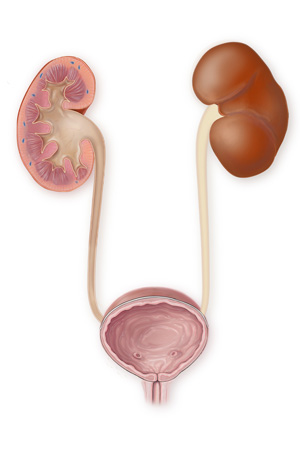How to Know if You Have Kidney Pain or Back Pain
Kidney Hurting
Kidney hurting is felt in the sides or dorsum. It is often mistaken for back hurting. Kidney hurting can be caused by kidney stones, urinary tract infection, kidney infection, an injury or kidney cancer.
Overview

What is kidney pain?
People frequently mistake kidney pain as back pain.
Dissimilar back hurting, which usually occurs in the lower dorsum, kidney hurting is deeper and higher up the dorsum. The kidneys can be found underneath the ribcage, on each side of the spine. Pain from the kidneys is felt in the sides, or in the middle to upper back (nigh often nether the ribs, to the right or left of the spine). The hurting may besides progress to other areas, such equally the abdomen or groin.
Kidney pain is a result of swelling or blockage in the kidneys or urinary tract. Other symptoms such as fever, vomiting, or painful urination are clues that the pain is a consequence of a kidney trouble.
Possible Causes
What are possible causes of kidney pain?
Considering the kidneys filter the blood, class urine, and laissez passer it out of the torso through tubes called ureters, issues in any of these areas could consequence in pain. Some of the more common causes of kidney hurting include:
- Kidney stones : Kidney stones form from the buildup of minerals or chemic wastes within the body. Stones may exist every bit small as a grain of sand or larger than a pearl. If they are small they may pass out of the body. Even so, larger stones may get stuck in the urinary tract and prevent urine from passing. In either instance, intense pain can result.
- Urinary tract infection : An infection anywhere forth the urinary tract caused past bacteria left backside after urination. Symptoms may include fever, painful urination, cloudy urine, and general fatigue.
- Kidney infection (pyelonephritis): A kidney infection occurs when leaner from a float infection has spread to the kidneys. People with diabetes or who have a blockage in the urinary tract are more likely to go a kidney infection. In chronic cases, some problem in the urinary tract causes urine to flow backwards from the bladder upwardly to the kidneys, resulting in repeated infections and possibly permanent kidney damage.
- Polycystic kidney disease : An inherited status in which fluid-filled sacs (cysts) develop inside the kidneys. Equally the cysts expand, the kidneys become enlarged and may eventually lose their ability to function.
- Injury or trauma: Any potent touch on or blunt forcefulness to the kidney area (such as in contact sports or an blow) may cause a laceration or other physical damage to the kidneys. Such incidents may besides cause a disruption of normal blood menses to the kidneys. Astute (sudden) kidney failure may result from kidney trauma.
- Kidney (renal) cancer : Renal jail cell carcinoma is the about common blazon of kidney cancer. It usually affects people in their 60s or 70s, rarely appearing in those nether the historic period of l. If they occur at all, symptoms include blood in the urine, a persistent pain in the back or side simply below the ribs, and a lump or swelling in the side.
Care and Treatment
How is kidney hurting treated?
Treatment of kidney hurting depends on what condition is causing it. In order to pinpoint a cause, a number of tools are available to help your doctor make a diagnosis:
- Urinalysis: Checks for the presence of blood, excess white blood cells (which would point to an infection), proteins, and sure chemicals that are linked to various kidney disorders.
- Imaging tests: Ultrasound or a CT (computed tomography) browse provides an prototype of the physical construction of the kidneys and urinary tract, sees if stones are present, and helps make up one's mind if blood menstruation is adequate.
When to Call the Doctor
When should I call my doctor?
See your dr. if yous accept persistent pain in the kidney area, and if yous have back pain forth with whatsoever of the following symptoms:
- Fever
- Discolored urine
- Painful urination
- Blood in the urine
- A repeated urgent need to urinate
- The appearance of solid material (kidney stones) in the urine
- A general feeling of illness or lethargy that will not go away
Source: https://my.clevelandclinic.org/health/symptoms/17688-kidney-pain#:~:text=Unlike%20back%20pain%2C%20which%20usually,or%20left%20of%20the%20spine).

Post a Comment for "How to Know if You Have Kidney Pain or Back Pain"